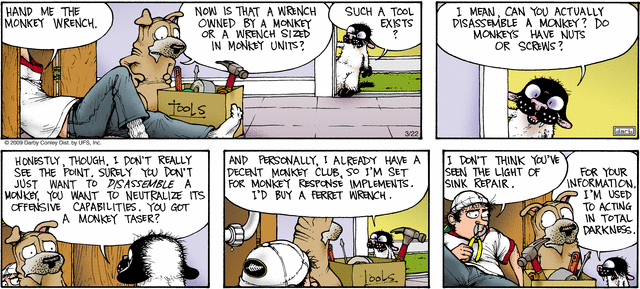Compound semantics
« previous post | next post »
Today's Get Fuzzy:

The OED's first citation for monkey wrench is 1807. The etymology is apparently unclear:
[… perhaps as a folk etymology from a surname, although this is uncertain and disputed. See, for example, V. Staten Did Monkeys invent Monkey Wrench? (1996) 41-3 and G. Stimpson Bk. about Thousand Things (1946) 287.]
The surname in question is that of Charles Moncke, who is widely (but apparently falsely?) asserted to have been a London blacksmith who invented an adjustable wrench.
Bobbie said,
March 22, 2009 @ 3:09 pm
If you can't fix that leak with a monkey wrench, use a little duck tape! (This is a pun here, folks, so no one has to tell me how the word is supposed to be spelled!) I definitely like the idea of a ferret wrench….
Tim said,
March 22, 2009 @ 3:47 pm
Well, supposedly, the original term was "duck tape".
Terry Collmann said,
March 22, 2009 @ 4:58 pm
On the other hand Mole grips were manufactured by MK Mole and Son, rather than designed to extract recalcitrant moles from their holes …
Katherine said,
March 22, 2009 @ 7:26 pm
So what is a monkey wrench? Personally I've always been one to call a spanner a spanner.
Skullturf Q. Beavispants said,
March 22, 2009 @ 11:51 pm
That's only because you come from the land of the zebra crossings. :)
Auntie Em said,
March 23, 2009 @ 8:22 am
Nah – a spanner is a spanner, a monkey wrench is an adjustable spanner!
Mark Liberman said,
March 23, 2009 @ 8:34 am
The Wikipedia article claims that the terms monkey wrench is properly used for "an adjustable wrench … that was popular in the 19th century but is rarely used today."
This picture shows (on the right) the kind of wrench, properly called a Stillson wrench or pipe wrench, which is what Rob Wilco is talking about the strip reproduced above.
The Wikipedia article promotes the view that this (very widespread) usage is incorrect, because it's a substitution for the (no longer used) original referent. This strikes me as an especially silly form of technological prescriptivism, rather like saying that since computer originally meant "A person who makes calculations or computations", it's wrong to use the same word to refer to an electronic device.
Craig Daniel said,
March 23, 2009 @ 10:00 am
I always assumed – without any evidence whatsoever, but this is the kind of bogus etymology that people come up with as little kids – that because it was adjustable it could imitate whatever other size wrench you need. Monkey wrench see, monkey wrench do.
Dick Margulis said,
March 24, 2009 @ 7:10 am
Regarding this:
The Wikipedia article promotes the view that this (very widespread) usage is incorrect, because it's a substitution for the (no longer used) original referent. This strikes me as an especially silly form of technological prescriptivism, rather like saying that since computer originally meant "A person who makes calculations or computations", it's wrong to use the same word to refer to an electronic device.
When you walk into a hardware store of a certain type, the rule in force is "things have names," and I think the Wikipedia article is written from the point of view of that particular subculture. If what you want is a Stillson wrench, asking for a monkey wrench may provoke derisive laughter among the store's denizens. Such stores are fast disappearing, of course. My aim here is not to defend that cultural practice, only to describe it before it vanishes altogether.
Terry Collmann said,
March 26, 2009 @ 4:57 pm
Four candles.
Allan Beatty said,
March 27, 2009 @ 10:40 pm
I was amused to learn that the French term is clef anglais. Are the French calling us monkeys?
Bob E. said,
February 18, 2010 @ 3:48 pm
WUPS! Almost snorted Diet Coke out of my nose when I read Terry's March 26 contribution! (Got any pumps?)